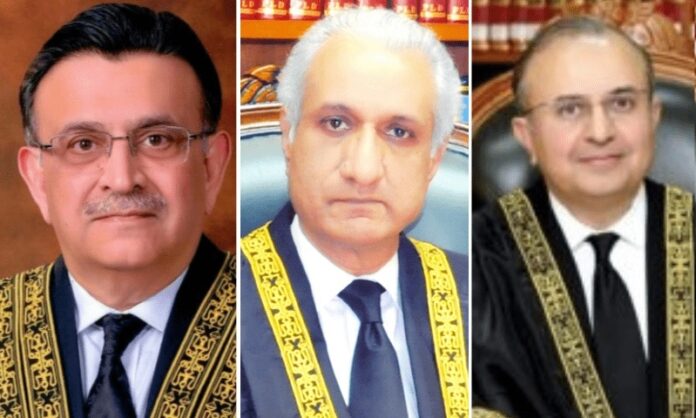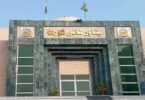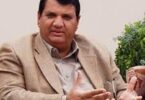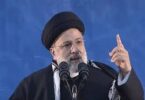ISLAMABAD (Agencies): Chief Justice of Pakistan (CJP) Umar Ata Bandial on Thursday said the “solution of all issues of the country is only possible through the people’s decision” as he heard PTI Chairman Imran Khan’s petition against the August 2022 amendments to the National Accountability Bureau (NAB) ordinance.
A three-member Supreme Court bench — comprising CJP Bandial, Justice Syed Mansoor Ali Shah and Justice Ijazul Ahsan — resumed hearing Imran’s plea, which claims the new NAB laws are a “violation of fundamental rights”. At the outset of the hearing on Thursday, discussing the general elections, Justice Bandial said: “The solution of all issues of the country is only possible through the people’s decision. Eight months have passed since the incumbent government came to power.”
He referred to a prior ruling of the Election Commission of Pakistan (ECP) saying: “The ECP had stated in the speaker ruling case that they would be ready to conduct elections in November 2022.” The CJP asserted: “The current parliament has been systematically kept incomplete. The legislation taking place in the current parliament is also becoming controversial [as a result].”
After hearing the arguments, the three-member bench adjourned the next hearing till 11am on Feb 10 (today). Arguing that Imran did not have the right to lodge the petition, the federal government’s lawyer, Makhdoom Ali Khan, said: “The court should remain cautious about Article 184(3) of the Constitution. “If the court suspends legislation over any petition under Article 184(3), the standard will drop. The authority of Article 184(3) exists in public matters.”
CJP Bandial responded: “The realities of the present case are different. The chief of the country’s biggest political party has challenged the NAB amendments. “There is intense political tension and crisis in the country. The PTI first applied the strategy of leaving parliament. Then, it was not known why they decided to return to parliament. The petitioner Imran Khan is no ordinary citizen. Even after leaving the government, he has enjoyed enormous public support.“
CJP Bandial stated that the judiciary did not want to meddle in the legislative either and that it had not taken notice itself but a petition had been filed. He highlighted that the court had rued its decision once before as well. “Only one prime minister has come in Pakistan’s history who was considered very honest. One honest prime minister’s government was ended through 58 (2b). Article 58 (2b) was a draconian law. The court had said in 1993 that the government was [sent packing] in the wrong manner but only elections should be conducted now,” the CJP said.
He added: “The PTI chief is not in the assembly and legislation like the NAB amendment is now becoming controversial.” Justice Bandial asserted that it was not about Imran’s right to challenge the verdict, and he dismissed the same objection raised by the federal government’s lawyer. Meanwhile, the government’s lawyer said: “The court has to determine what is the standard of cases regarding fundamental rights. Can anyone challenge legislation based on assumptions?”
Replying to this, the CJP reiterated that Imran was no ordinary man but “the chief of a huge political party of the country and was a former prime minister”. Justice Bandial added: “His party decided to resign from the parliament due to political conflicts. His party then changed its mind and now they want to return. But they are not a part of parliament right now. But parliament is there. Remarking that corruption existed in the country since the “first day”, he recalled how an “extremely sincere prime minister’s government was ousted under Article 58(2b)”.
The CJP highlighted that the judiciary of that time recognised the ouster as wrong but still allowed the elections to be held, facing “great criticism on its decision”. Justice Bandial reiterated that the Chief Election Commissioner Sikandar Sultan Raja had assured him in November last year that the electoral body was “ready to hold elections any time”.







